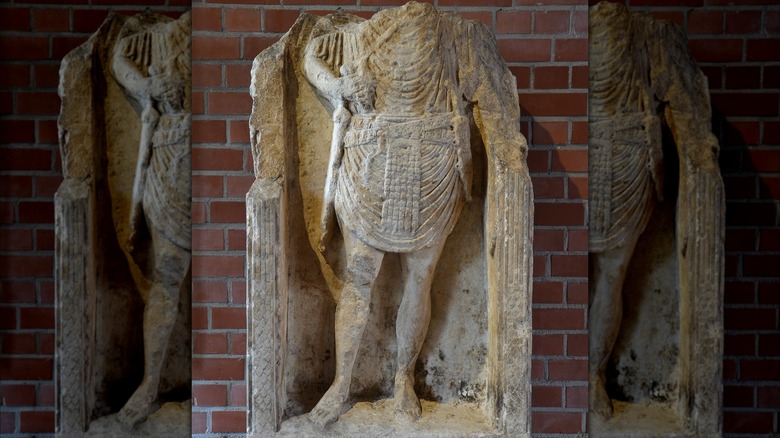Who Is Panthera, Roman Soldier And Supposed Biological Father Of Jesus?
So the story of Mother Mary and Jesus' birth is familiar to many of us, right? There was a teenager Mary living in the Roman province of Judea about 2,000 years ago who got pregnant after sleeping with a Roman soldier, Panthera. She got kicked out of her betrothed's house, wandered around a bit, and when her kid was born he eventually went to Egypt to look for work. In Egypt he learned Egyptian religious practices — either as an official initiate or just offhandedly — and headed back to Judea as an adult, saying that he was the divine son of God and concocting a "virgin birth" tale.
Before believers in the crowd declare blasphemy, heresy, and whatnot: That version of Christianity's origin dates back to the religion's earliest days, when it was just one of many foreign cults in the Roman Empire, as sites like the Jason Colavito website overview. This desacralizing take on Jesus' background circulated amongst Jews side-by-side the now-canonical Christian story, the latter of which folks like the 2nd-century Greek writer Celsus viewed as propaganda and a threat to the order of society and the Roman state, as outlined on Bluffton University. Information on Panthera is hard to verify, and many have long-dismissed the ancient claims as spurious — especially in Christian-dominated societies — but even today the tale lingers.
A cultish threat to established order
First off: This article doesn't exist to support, defame, etc., Christianity or its detractors, or to reduce the vastness of history to a simplistic matter of "sides." Non-Christians will look at the Panthera story and say, "Well sure," as surely as Christians will say, "Not true." Facts won't change beliefs. Even so, facts on this topic are surprisingly scarce, assumedly because it's so sensitive. It's slid from the spotlight of knowledge, but sources do exist.
On that point, in "A True Discourse" (175 to 181 C.E.), Greek writer Celsus relates what he'd heard whispered amongst Jewish communities of his day, including stories of the Roman soldier Panthera. Celsus' time witnessed an obscure Jewish cult rise to prominence across a wide swath of people, free and enslaved, men and women. Even though Christianity didn't only appeal to the underclass, as World History Encyclopedia discusses, it did include them, which would have seemed like a threat to the established order. This is especially true because Christianity was monotheistic — i.e., "our god or no god" — just like Judaism, which in a multicultural, polytheistic Roman Empire might have seemed presumptuous or disrespectful.
And so, as Bluffton University quotes Celsus, Christianity existed for "the silly, and the mean [the poor], and the stupid." To those suspicious of that early cult, it made perfect sense that the founder wasn't some divine entity, but just a guy with a tall tale swallowed by the gullible.
40 years of service to the Roman military
Much of the historical data about the life of Panthera comes from his actual tombstone. Or at least, all evidence — especially timeframes — suggest that the tombstone in question belongs to the Panthera mentioned in Celsus' "The True Doctrine." As Imperium Romanum describes and shows, Tiberius Julius Abdes Panthera (sometimes written Pantera or other spellings) was a non-native Roman of Semitic origin from Sidon in modern-day Lebanon. During the reign of Emperor Tiberius (14 to 37 C.E.), he became a Roman citizen after 25 years of service in the empire's military granted him citizenship — and subsequently got "Tiberius Julius" added to his name. In the end, Panthera was the standard bearer of the "1st Sagittariorum cohort" of Roman archers for 40 years and died at the age of 62.
As author Robin Helweg-Larsen's historical website calculates, if Panthera reached 40 years of service during the reign of Tiberius, he would have started between 27 and 4 B.C.E and been born anywhere between 45 and 22 B.C.E. An article from Greece & Rome notes that scholars generally agree Jesus was born in 7 B.C.E. during the reign of King Herod, when Panthera would have been anywhere from 15 to 38 years old. And since Panthera's cohort of archers passed from Palestine to modern-day Germany from 6 to 9 C.E., at minimum there was indeed a Roman soldier named Panthera who could have encountered Mary, the Mother of Jesus at just the right time.
[Featured image by Pudelek (Marcin Szala) via Wikimedia Commons | Cropped and scaled | CC BY-SA 3.0]
A teenage Jewish girl and a Roman soldier
The Times of Israel outlines Panthera's narrative, an almost by-the-books tale of an older man and a younger girl, and a sexual act in a field that might or might not have been consensual. No information exists concerning the specifics of Mary's and Panthera's relationship, except conjecture about words and glances shared between a teenage Jewish girl and a Roman soldier traveling through her hometown of Nazareth. As the story goes, Mary — Miriam, by the Jewish name — was deemed a sotah, or "unfaithful wife," to her betrothed Joseph when her pregnancy came to light. This made Jesus — Yeshu, more properly — a mamzer, or "bastard." And indeed, various Jewish texts including the Talmud refer to a Yeshu ben Pantera, or "Jesus, son of Panthera," as sites like the biblical website of Dr. James Tabor relate.
A bastard son wouldn't exactly have been welcome in Jewish society. In fact, he would have been something of an outcast, which jives with Greek writer Celsus describing Jesus as looking for work in a foreign country, Egypt. And so, Jesus' "miracles" may have been adapted Egyptian ritual magic. Interestingly, in 2008 NBC News reported that scientist Franck Goddio and his team discovered an ancient bowl in Alexandria with the engraving "DIA CHRSTOU O GOISTAIS," which they concluded means "the magician by Christ," or "by Christ the magician." Goddio said it "could very well be a reference to Jesus Christ, in that he was once the primary exponent of white magic." The bowl was determined to have originated somewhere between the late 2nd century B.C.E. and the early 1st century C.E.
The Times of Israel writes of Jesus, "He believed himself to be the son of God when such a thought was anathema to all strains of Jewish belief and thought. He was not a prophet and by that concept he offended the Jews and violated written law which states that Malachi was the seal of the prophets and that no further prophecy could exist in Israel."
[Featured image by the State of Israel via Wikimedia Commons | Cropped and scaled | CC BY-SA 2.0]
Rebuttals, refutations, and lasting evidence
Some of the rest of Celsus' writings about Panthera and Jesus' non-divine origin are pretty brutal, many highlights of which are available to read on sites like Early Christian Writings. In general, he calls Christian doctrine absurd, its practitioners idiots, and Jesus a liar. So, it's understandable why Christian scholars and lay Christians alike react strongly to "The True Doctrine" and define its accounts as a "polemic," as Oxford Classical Dictionary describes.
Come 248 C.E., Christian author Origen of Alexandria penned the tellingly named "Against Celsus" describes, which disputes the philosopher's arguments point for point. Interestingly enough, as a result Origen wound up helping to perpetuate Celsus' writings and keep them alive longer than they might have otherwise. And yet, the story of Panthera by now has faded to the fringes of ecclesiastical knowledge.
As for Panthera himself? Ultimately, we can only say for sure what it reads on his tombstone: He lived, he was a soldier, and he died. As Robin Helweg-Larsen says on his historical website, Panthera's tombstone was only discovered as recently as 1859 C.E., in modern-day Germany in the town of Bingerbrück. The tombstone rests in Museum Römerhalle in the town of Bad Kreuznach southwest of Frankfurt, waiting for folks to visit and wonder just who, if anyone, he sired.




